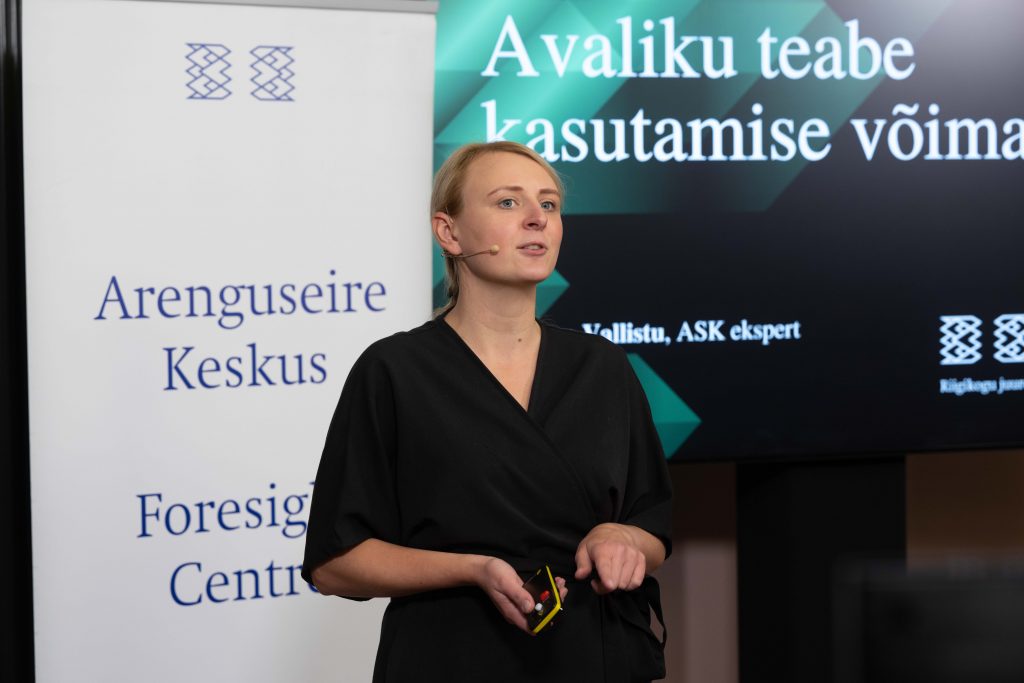Study: There’s an imbalance between data protection and disclosure of public information
According to the study “Trends in access to public sector information”, published by the Foresight Centre, the balance between the data protection requirements and the right to obtain public information is askew in Estonia. The implementation of the European Union General Data Protection Regulation (GDPR) has reduced the availability of data even further.

“We have left the official in charge of replying to data requests too alone,” Head of the Foresight Centre Tea Danilov said. “GDPR has introduced heavy penalties for mistakes. Fears of violating data protection rules are not sufficiently counterbalanced by risk management measures, such as guidance and advising. Replying to data requests is usually labour-intensive additional work that is not taken into account separately in remuneration. All this is leading to restricting the disclosure of public information just in case.”
According to Maarja Pild, Attorney-at-Law at TRINITI Law Firm, one of the conclusions of the study suggests that, from the legislative perspective, a significant number of additional restrictions have been imposed on the publication of public data. “At the same time, it is interesting that while the legislation has added restrictions, the case law in its turn has contributed to facilitating access to public information.” Access to public data is also being restricted by technological means and increasing state fees, and in Pild’s opinion it is often difficult to find any practical reason for this.
According to Johanna Vallistu, head of monitoring the future of data freedom and expert at the Foresight Centre, one of the key questions is how the state could make better use of the information it collects to operate more efficiently. “Estonia has the potential and capability to act as a country in a much more data-driven and efficient way, and to introduce more automated decision-making processes,” Vallistu said, and gave the example of targeted automatic family and energy subsidies. “In the study, we have also developed a roadmap for targeted automatic subsidies for that.”
In her comment, Minister of Justice Lea Danilson-Järg stressed the importance of ensuring access to public information for the press. “Although Estonia is in a relatively good position in regard to public information compared to other countries, we must continue to work to increase the transparency of the state,” she said. However, in her opinion, it is necessary to take into account the need to protect personal data and, in the current war situation, it is necessary to keep in mind the security aspects. “Therefore, I call on the media to cover the issues concerning Estonia’s vulnerabilities responsibly, considering that the media are also followed by forces hostile to us,” she added.
Commenting on the study, jurist Kärt Pormeister pointed out the randomness in imposing access restrictions on access to public information. “Availability of public information is not a matter of the generosity of the state, but a constitutional obligation,” Pormeister said. “As a rule, public information must be available to everyone, and access can be restricted only in extraordinary cases. At present, restrictions are sometimes imposed just in case, to disperse risks.”
The summary of the study “Trends in access to public sector information” is available on the Foresight Centre’s website here.
Watch the video recording of the presentation (in Estonian).
In 2022, one of the lines of study of the Foresight Centre is focusing on the future of data freedom, examining the key development trends and options in the further development of Estonia’s data economy and data-driven governance until 2035. One component of data freedom monitoring is also the study of the opportunities to use public information, which explores the legal and practical usability of public information in Estonia.
The Foresight Centre is an independent think tank at the Riigikogu that analyses long-term developments in society and economy. The Centre conducts research projects to analyse the long-term developments in the Estonian society, and to identify new trends and development directions.
Latest news
-
27.06 2025Current low birth rate will lead to up to 1.3 billion euros less tax revenue in the future
In its new short report “The impact of population ageing and low birth rate on long-term state revenue and expenditure”, the Foresight Centre notes that the lower than projected birth rate will reduce government spending on family policy and education, but in the long term, it will mean up to 1.3 billion euros less in tax revenue.

 An independent think tank at the Riigikogu
An independent think tank at the Riigikogu